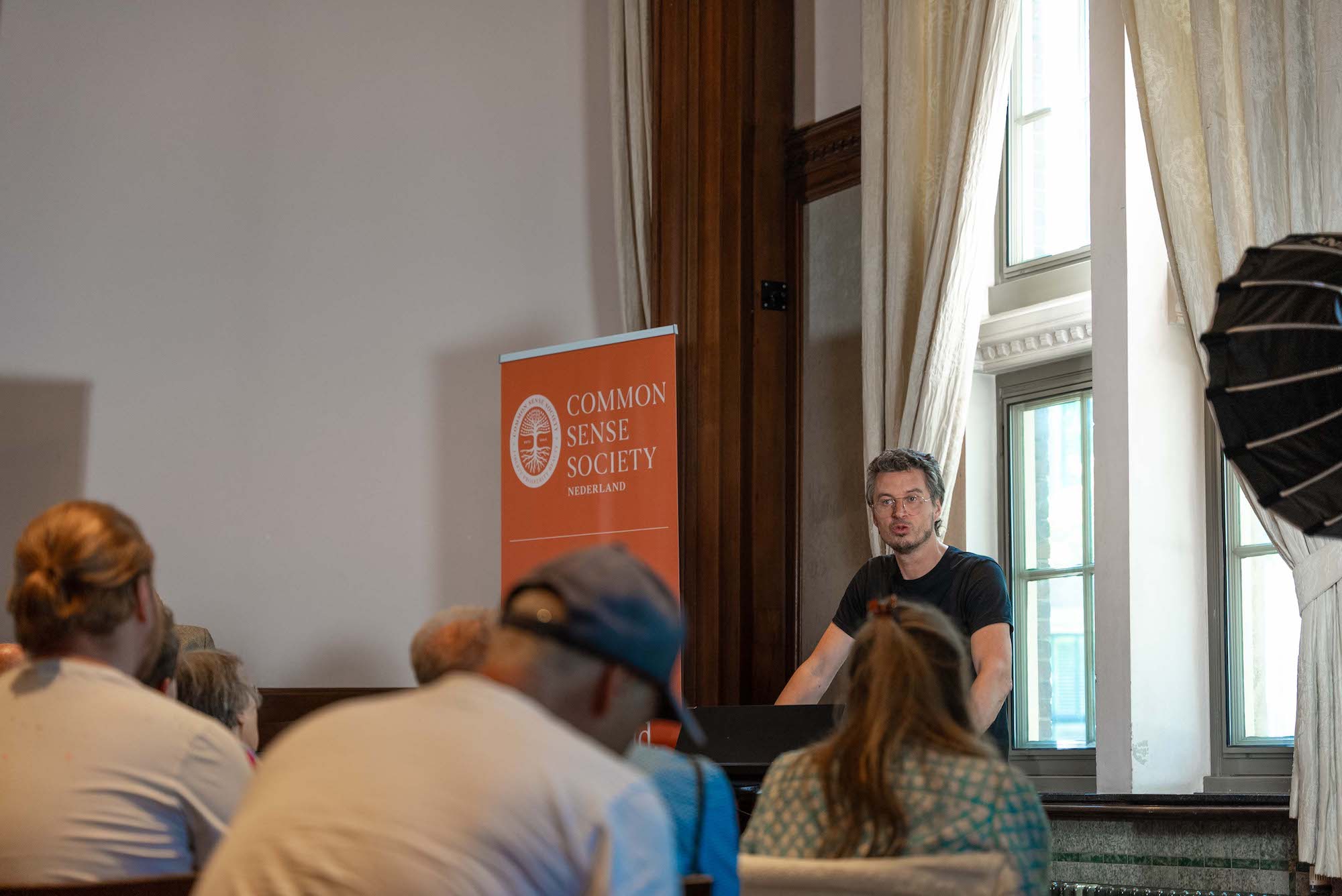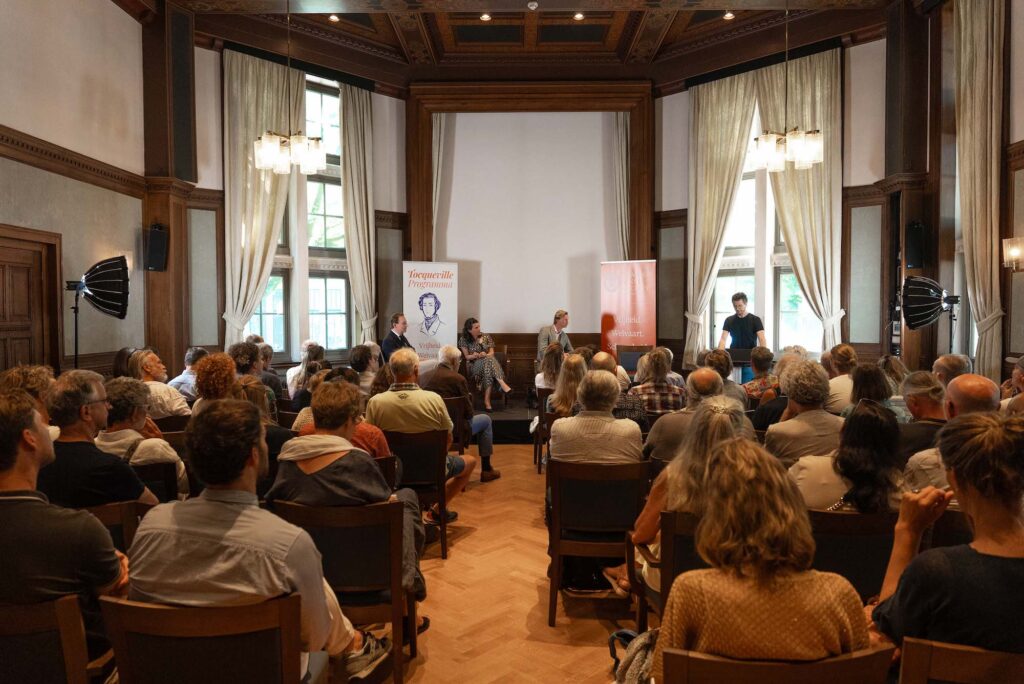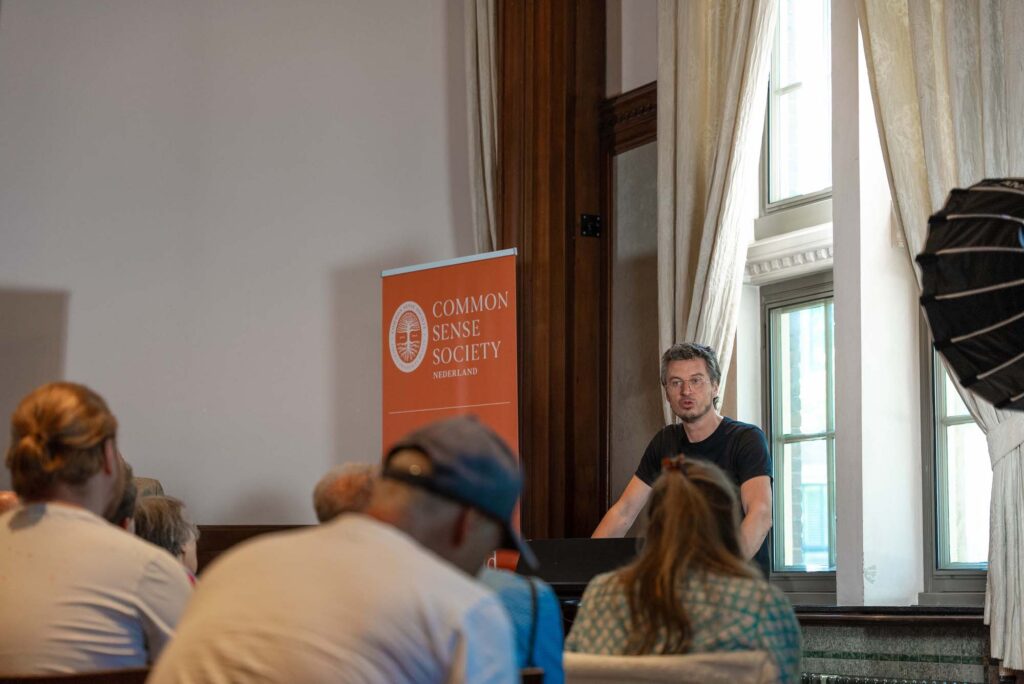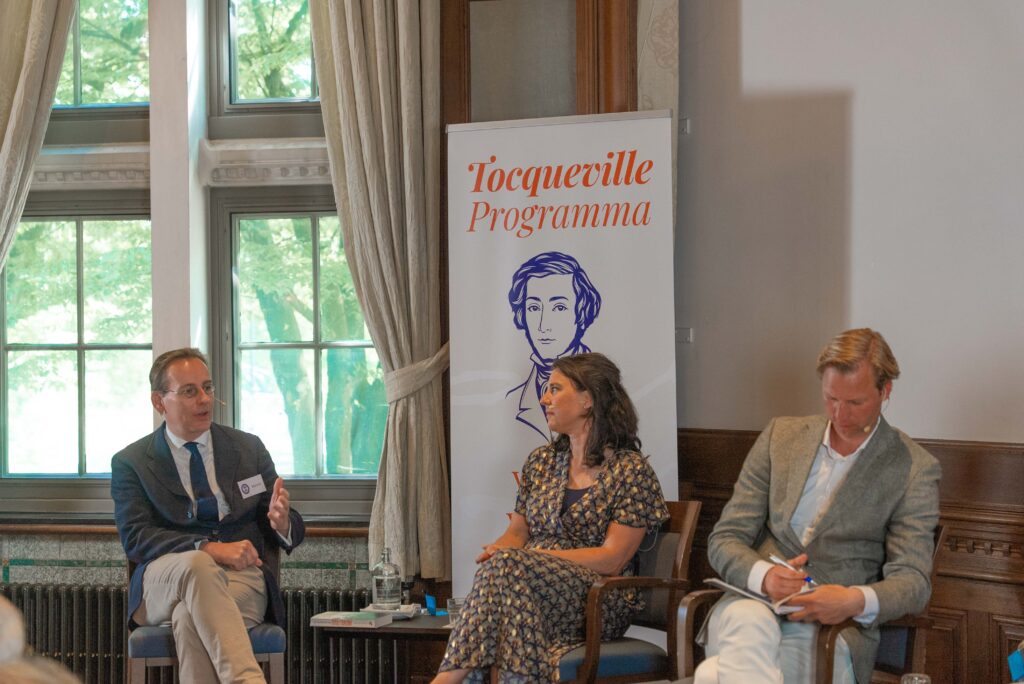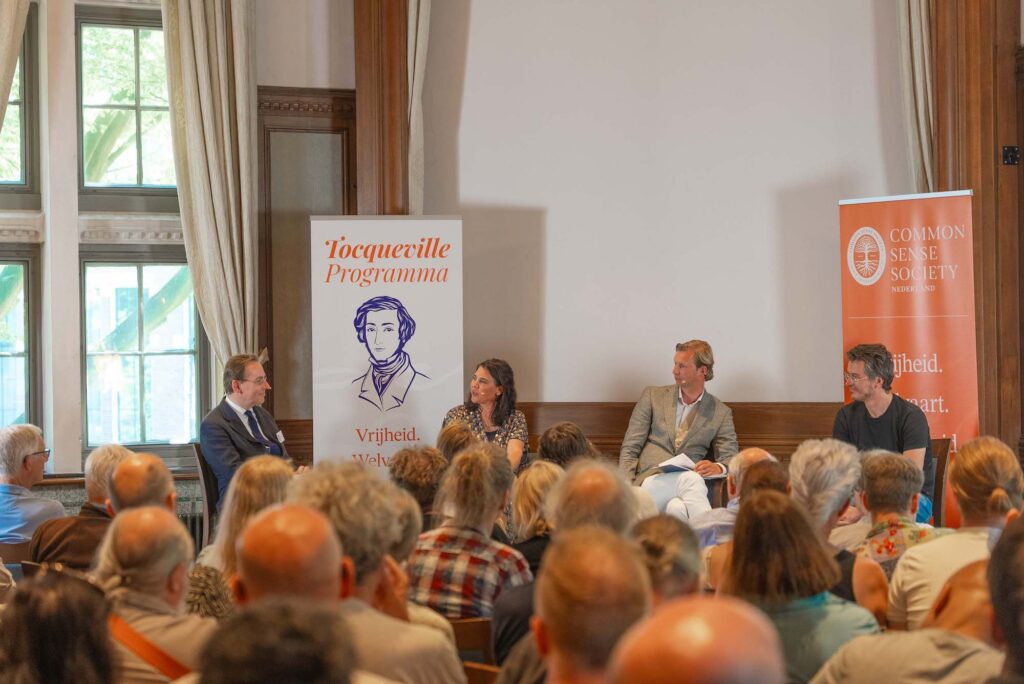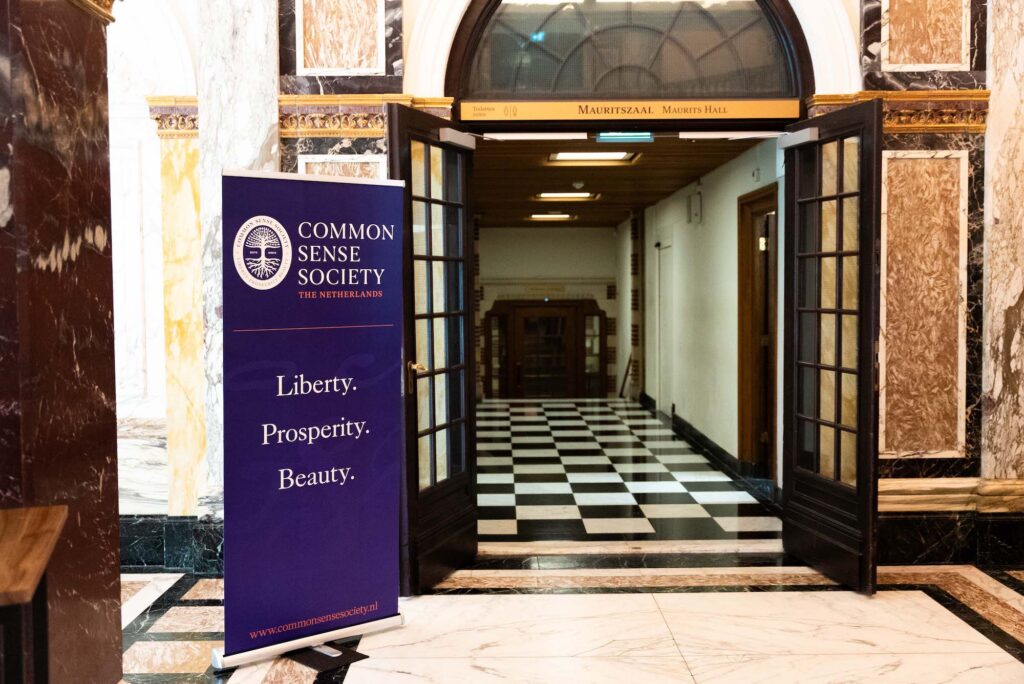On June 10, 2023, Common Sense Society–The Netherlands (CSS–NL), in collaboration with the Physicians Collective Foundation, organized a public lecture on mass formation and the response to COVID-19. The speaker was Prof. Dr. Mattias Desmet, a renowned Flemish social scientist who has been a controversial but important voice in the corona debate. A professor of clinical psychology at the University of Ghent, Desmet has expertise in both psychoanalysis and statistics. In February 2022, he published the book The Psychology of Totalitarianism, which puts the relationship between mass formation, corona policy, and totalitarianism into historical and psychological perspective. After his lecture, Desmet engaged in conversation with Hannah Visser, an internist-infectiologist and co-founder of the Physicians Collective Foundation, and Pieter Jan Dijkman, director of the Scholarly Institute for the Christian Democratic Party, which has issued a critical report on the Dutch government’s corona policies.
What did we discuss?
Desmet opened his lecture with the two reasons for writing his book. First, he believed the danger of COVID-19 was structurally overstated. As an example, he cited the mortality rates, which—in accordance with his expectation—turned out to be at least three times lower.
As a second reason for writing his book Desmet cited the pressure on freedom of speech. Criticism was discouraged during the corona period. The public was expected to believe science, while discussion—the basis for science—was increasingly made impossible. This led Desmet to the key question: what psychological processes lead people to be willing to swallow demonstrable absurdities without blinking an eye?
The explanation, according to Desmet, lies in mass formation. This is a special kind of group formation in which critical thinking is eliminated. As historical examples of mass formation he cited the Crusades, the French Revolution, and the totalitarian systems of the Soviet Union and Nazi Germany. It is typical of mass formation that people fall into the grip of an ideology. That is, to become obsessed to the point of making disproportionate sacrifices for it and, ultimately, to be willing to give up everything for it. This is accompanied by extreme intolerance toward dissidents. In the final stage, this intolerance becomes so strong that it even erodes the family. Thus children may come to betray their parents, or vice versa, “in the name of the revolution”—or whatever other ideal may underlie the mass formation.
COVID-19 was the first mass formation on a global scale, according to Desmet. Never before has the world known larger crowds nor technology that has made global communication so accessible.
According to Desmet, at the onset of the corona period the two main conditions for mass formation had been in place for some time in Western societies. First, there was a widespread and deeply felt degree of loneliness. Second, and consequently, there was an equally widespread lack of meaning. The result, he said, was a sense of aggression and frustration, without the ability to interpret and release it.
Done collectively, the venting of such frustration creates a strong bond between people, Desmet maintained. A propaganda strategy that interprets the frustration that is widely felt paves the way for a scapegoat. This process appears to satisfy the deepest and most human needs, namely community and meaning. However, this is no more than illusory. In actuality, the attachment to other people is crumbling further, in direct proportion to the increased attachment to ideology. This phenomenon was also visible during the corona era, Desmet argued. All media outlets preached social isolation and vaccination in the name of solidarity, but if something happened to a stranger without a mask, no one was allowed to help. Solidarity with the collective had been increased, but it was done at the expense of solidarity with individuals. Never before had we been so atomized and lonely.
Still, should we then immediately reach for heavy terms like “totalitarianism”? Desmet argued that we should. The term “dictatorship” simply does not cover it. A dictatorship refers to a broad-based social fear of the violent potential of a small group of rulers. As long as the power of these rulers is respected, or at least not threatened, citizens enjoy a reasonable degree of personal freedom. This stands in contrast to totalitarian societies, where control of thought and action extends even into the living room.” ‘”Correct” thinking and speaking is enforced everywhere. That is exactly what we saw happening during the corona period, according to Desmet.
Desmet summarized the historical development of totalitarianism, based on the explanation Hannah Arendt already posited in the 1960s. According to him, totalitarianism is an outgrowth of modernity, during which the dominant worldview has become mechanistic and materialistic. It renders the world a collection of elementary particles, including people. As a result, isolation and the idea of social engineering emerged. Solving social problems would now be a matter of pushing the right buttons. In this context, Pieter Jan Dijkman referred to Health Minister Hugo de Jonge’s statement about “dashboard politics.” That the world might not be completely manageable is completely foreign to this concept.
Can anything be done to counter this development if it was set in motion decades or even centuries ago? Desmet argued that honesty is the antithesis of, and thus the remedy for, mass formation and atomization. According to him, the most distinctive characteristic of human beings is their ability to doubt. After all, no animal ponders the meaning of life. By speaking boldly, mass formation cannot proceed to the final stage, characterized by violence and inhumanity. This requires an open style of speaking that is alien to the intolerant.
Responding to Desmet, Hannah Visser described the situation during corona from her experience as a physician. Rapidly, opinions were barred in the professional medical circuit. The corona team at the hospital where she worked consisted of only a few medical experts and a disproportionate number of communication specialists. That fostered a situation where free speech was restricted in favor of a public relations strategy.
Pieter Jan Dijkman agreed that there can be no free society in the absence of a sanctuary for free thought. The situation described by Hannah Visser, in which it is increasingly decided what may and may not be thought and discussed, is the antithesis of a free democracy. Dijkman added that, in his view, various conceptions of humanity reinforced the loneliness that Desmet saw at the foundation of censorship. Here he mentioned, first, the liberal idea of the self-made man; second, the tendency to view oneself as a victim of capitalism and government; and finally, materialism as Desmet described it. Fear is not an evil in itself, Dijkman argued, but a government that uses fear as an instrument to (re)organize society is problematic.
What may we conclude?
During corona, quickly a situation developed in which a narrative of right and wrong was imposed. The marketplace of ideas was reduced to a binary environment of truth and falsehood. Accordingly, freethinkers were labeled immoral heretics, and followers of the official narrative were deemed sensible moral citizens. The lack of a space in which to peacefully disagree with one another was typical of the strange social pressures that rapidly made themselves felt after the first COVID-19 wave in 2020.
